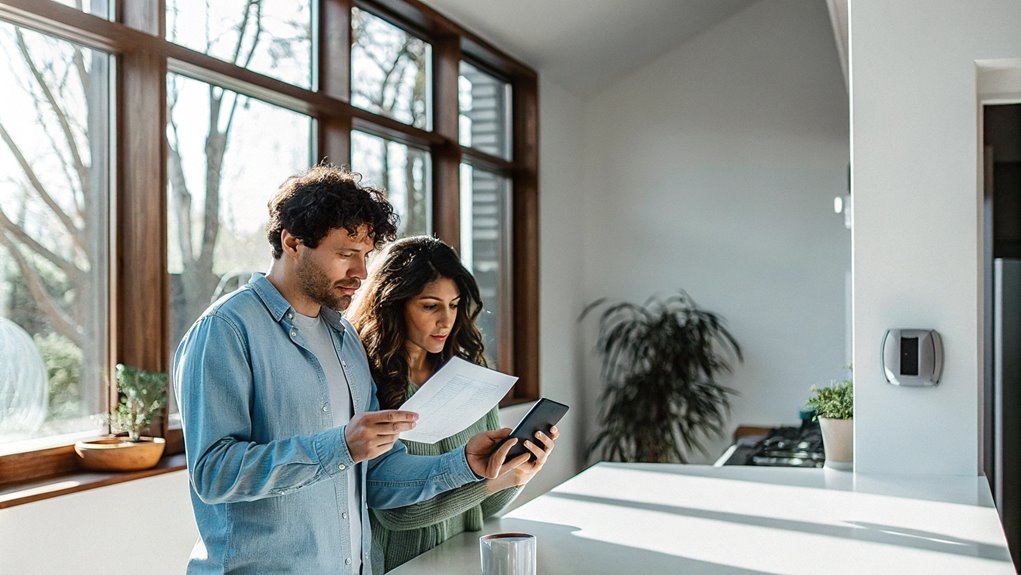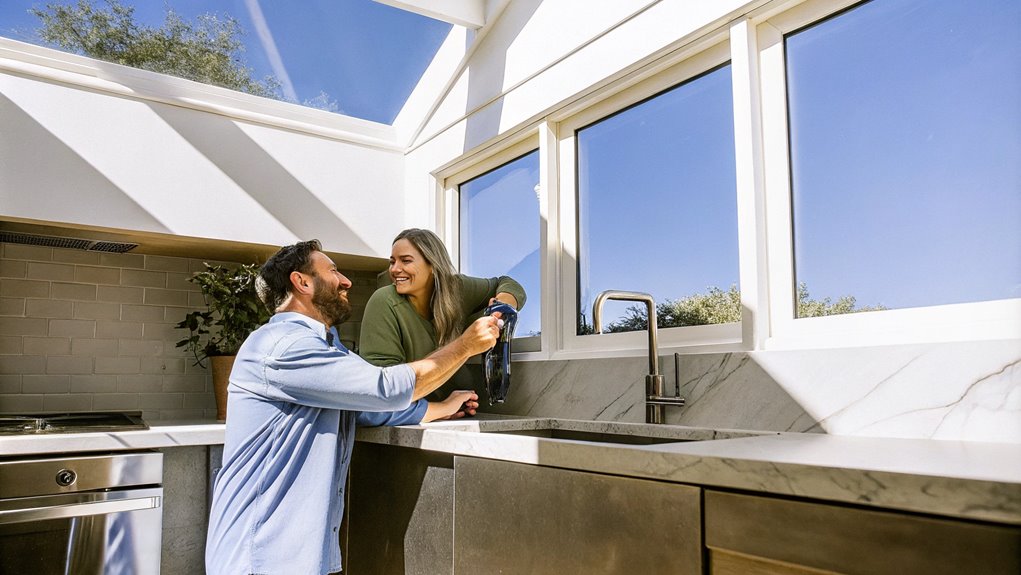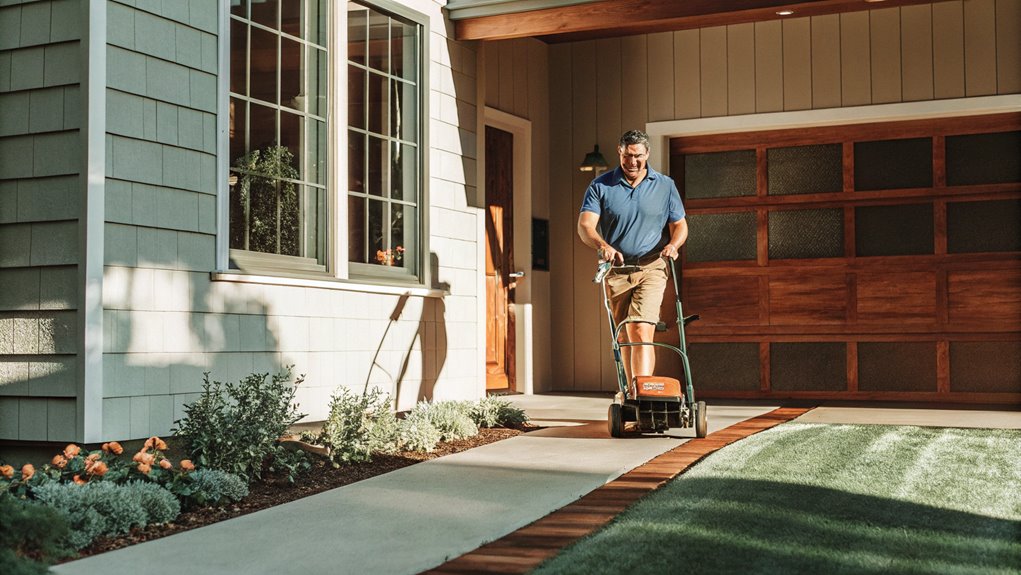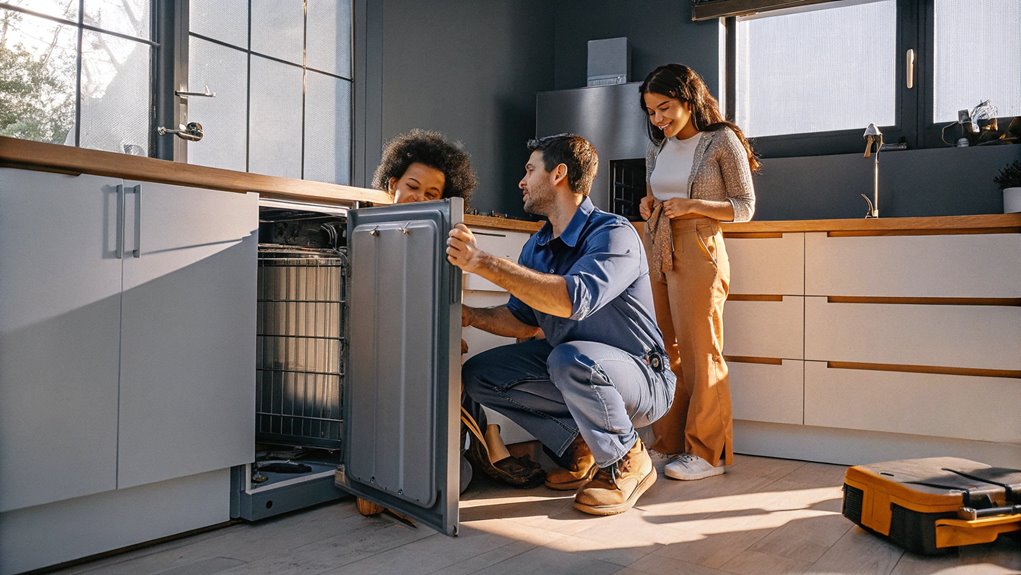Buying a home costs more than just the price tag. First, you need cash for the down payment, which is like making a big first payment. You might pay 3 to 20 cents of every dollar of the home's price.
Each month, you pay bills like:
- Your home loan
- Taxes on your house
- Insurance to protect your home
- Water and power bills
If you live in a group of homes with shared areas, you pay fees to keep them nice. Your home also needs care, just like going to the doctor. Plan to spend money each year to fix things that break, like the air conditioner or roof.
When you know these costs ahead of time, you can save money and take good care of your home.
Ready to start building equity in your own Michigan home? Get your personalized home loan quote today.
Down Payment Requirements

Saving money for a house can be tough! You need to pay part of the home's cost upfront – this is called a down payment.
Most people think they need to pay 20% of the house cost as a down payment. But you have other choices! You can pay as little as 3.5% with an FHA loan. Some regular home loans let you pay just 3% to 5%.
But paying less now means paying more later. Your monthly bills will be bigger. You'll also need to pay for extra home loan insurance. If you can pay 20% now, you'll save money over time. You'll get a better loan rate and won't need the extra insurance.
The more money you can put down, the bigger house you can buy.
Banks look at how much money you make and how much you spend each month to decide if they can give you a loan.
Michigan residents, unlock the door to your new home. Request your home loan quote from Treeside Financial today.
Property Tax Calculations
When you buy a home, you need to pay property taxes along with your down payment. Your local tax office looks at how much your home is worth and uses that number to figure out your taxes.
Think of it like this: Different places charge different rates. Some areas ask for a small chunk of what your home is worth. Others want a bigger piece.
Every few years, someone checks if your home's value has gone up or down.
Most banks make it easy for you. They split up your yearly tax bill into 12 smaller payments. These payments get added to your monthly house payment.
Want to know what your taxes might be? Just find out your area's tax rate and do some simple math with your home's value.
Homeowners Insurance

Your home needs insurance to keep it safe. This helps pay for problems that might happen to your house and stuff inside it. Think of it like a safety net that protects you and your home.
You pick how much protection you want based on what your house is worth. The cost goes up or down based on where you live and how your house is built. It also changes if you've had problems before.
Want to pay less? You can! Put in safety locks and alarms. Get other insurance from the same company. Keep your bills paid on time.
You can also choose to pay more when small problems happen to lower your monthly costs.
Coverage Types and Limits
Your home needs six types of protection. Let's make them simple to understand.
- Dwelling: This pays to fix or rebuild your house if it gets damaged.
- Other Structures: This covers things like your garage or fence.
- Personal Property: This helps replace your stuff inside the house.
- Loss of Use: This pays for a place to stay if you can't live in your house.
- Personal Liability: This helps if someone gets hurt at your house.
How much money you get depends on what type of damage:
- Your house: Full cost to rebuild
- Garage or fence: 10% of house cost
- Your stuff: About half of house cost
- Place to stay: 20% of house cost
- If someone gets hurt: $100,000 to $500,000
Make sure you have enough money to rebuild your house today.
Some things like jewelry or art may need extra coverage.
Tell your insurance person about these special items.
Annual Premium Factors
Let's talk about what makes your house insurance cost more or less money each year.
Where you live matters a lot. If you live close to fire trucks or in a safe area, you might pay less. Living in a place that gets lots of storms might cost more.
The age of your house changes the price too. New houses often cost less to protect. Old houses with new parts, like good pipes and a strong roof, can also save you money.
You pick how much you'll pay if something bad happens – this is called a deductible. If you pick a bigger number, your yearly cost goes down.
Your past insurance reports and bill payments help set your price. Having safety items in your home like fire alarms and locks can lower your costs.
Some things in your yard, like pools, might make your price go up.
But you can save money if you get your car and house insurance from the same company.
Discounts and Savings Methods
Want to pay less for your home insurance? Let's look at some easy ways to save!
Team up your home and car insurance with one company. This can save you lots of money. You can pay up to 25% less!
Make your home safer to save more money. Put in:
- Door locks
- Fire alarms
- Security systems
These safety items can cut your costs by up to 20%.
Stay with the same insurance company for a long time. They'll give you a better price. If you don't make any claims for 3-5 years, you can also pay less.
Pick a higher amount to pay if something goes wrong. This makes your monthly cost lower. Keep your credit good too.
Fix up your home to save more:
- Get a new roof
- Update your pipes
- Fix old wiring
Ask your agent about more ways to save. Some companies give deals if you:
- Buy a new home
- Fix up your house
- Join work groups
Look at your insurance plan every year. New ways to save money come up often!
Private Mortgage Insurance
Getting a home with a small down payment means you'll need something called PMI.
PMI is a special fee you pay each month when you put less than 20% down on your home. This fee helps the bank feel safer about lending you money, but it doesn't help protect you.
Think of PMI like a monthly fee that costs between $50-$150 for every $100,000 you borrow. This gets added to your house payment each month.
PMI costs you more money because:
- You have to pay extra just because you'd a small down payment
- The money goes to protect the bank, not you
- You must keep paying until you own 20% of your home
The good news is you can stop paying PMI. You can ask to remove it when you own 20% of your home.
The bank must remove it when you own 22% of your home.
Monthly Utility Bills

When you own a home, you need to pay bills every month on top of your mortgage. Just like you pay rent, you must pay for lights, gas, water, and trash pickup. These bills can cost more or less based on your home and where you live.
Home bills often cost more than when you rent. This is because you now pay for the whole house, not just your space. You can ask the old owners what they paid each month. Or you can call the power, water, and gas companies to find out.
Your bills will change with the seasons. In winter, you pay more to stay warm. In summer, you pay more to stay cool.
To save money, you can get better home items that use less power. You can also add more padding in your walls to keep warm or cool air inside.
Regular Home Maintenance
Your home needs regular care to stay in good shape. Think of it like taking care of your body – you go to the doctor for check-ups to stay healthy.
Put aside $1-4 out of every $100 your home is worth each year. This money helps fix small problems before they get big and costly. This pays for things like:
- Checking your heating and cooling
- Cleaning gutters
- Taking care of your yard
Do these key jobs to keep your home safe and worth more money:
- Fix leaky faucets right away. Even small drips can cause big water damage.
- Look at your roof twice a year. A good roof keeps rain out.
- Clean and check your heating and cooling units often. This stops them from breaking when you need them most.
Save some money each month for these jobs. Put it in a special account just for home care.
Emergency Repairs

When things break in your home, you need to fix them fast. Even homes that get lots of care can have big problems pop up. Your pipes might burst. Your roof might leak. Your heating might stop working. These fixes can cost a lot of money.
You need to save money for when things break. Put away some cash each month, just for your home. Keep a list of good workers who can help fix problems right away.
You can also buy a home care plan. This can help pay for fixes, but read the rules first to know what it covers and what you must pay.
HOA Fees
Living in a HOA neighborhood means you pay extra fees.
These fees help take care of the whole area where you live. You might pay them every month or once a year. The fees can be between $100 and $700 each month. What you pay depends on where you live and what fun stuff you get to use.
Your fees help pay for things like:
- Keeping the streets and yards clean
- Taking care of plants and grass
- Guards to keep everyone safe
- Fun places like pools and tennis courts
The HOA also makes rules you need to follow.
They can tell you what colors to paint your house. They even say what kind of holiday lights you can put up. If you break these rules, you might've to pay more money.
Monthly Vs Annual Costs
HOA fees are a big cost when you own a home. You can pay them each month or once a year. Both ways have good points.
If you pay each month:
- It's easier on your wallet
- You can plan your money better
- The cost is spread out
If you pay once a year:
- You might save some money
- You only have to think about it once
- You need to save up more
Your HOA helps keep your home area nice. They:
- Cut grass and plant flowers
- Clear snow in winter
- Fix things that break
- Make sure homes look good
Think about how you like to pay bills. Some people like small monthly bills. Others like to pay big bills once a year.
Pick what works best for you.
Rules and Included Services
Your HOA is like a neighborhood helper that takes care of your community. They fix things and keep the area nice. You pay them each month, and they do jobs like cutting grass, keeping you safe, and making repairs to buildings.
They also help with basic needs. Many HOAs pay for your water, pick up your trash, and clear snow in winter.
Before you move in, you need to know the rules. These rules tell you what you can do with your home. They cover things like what colors you can paint, when you can put up holiday lights, and where you can park your car. Some rules even say what kinds of pets you can have.
Make sure you ask what your monthly payment covers. Each HOA is different. Also, look at their money records to see if they save enough for big fixes later.
Lawn Care and Landscaping

Your yard needs regular care to look nice. This means spending time and money to keep it healthy. You'll need tools like lawn mowers and rakes. If you don't want to do the work, you can hire someone to help. They often charge $100-300 each month when grass is growing.
Think about walking in your yard and feeling happy about how it looks. Your neighbors might smile when they see your pretty flowers and neat bushes. Your yard can be a fun place for family to play and make good times together.
You also need to buy things to keep your yard healthy. This includes plant food, wood chips, new plants, and sprinklers.
In fall, you'll need to clean up leaves. In winter, you might need to clear snow. Most people spend about $2,000-4,000 each year on their yards.
Pest Control Services
Your home is like a cozy shelter – not just for you, but sometimes for tiny unwanted guests too. Bugs, mice, and other pests might try to move in with you. To keep them away, you need pest control help.
A pest control expert will come to your home and spray special stuff to keep the bugs out. This costs about $30 to $100 each month. How much you pay depends on where you live and how big your home is.
Many people get their homes treated four times a year. This keeps away common pests like ants, roaches, and spiders. But if you have bigger problems like termites or bed bugs, it will cost more – from $2,000 to $8,000.
Don't try to fix pest problems by yourself. Store sprays might work for a little while, but they won't solve the real problem.
Without expert help, the pests will come back, and you'll end up paying more money later.
Property Value Assessment

Your home has two main values to know about. One is what people might pay for it today. This changes a lot based on what's happening with nearby home sales.
The other is what banks think it's worth when you want to borrow money. The tax office also gives your home a value, but this is just for deciding how much you pay in taxes each year.
Want to know what your home is really worth? Get help from someone who looks at homes for a living. They'll check your home, look at what other homes sold for, and tell you what yours is worth.
Market Value vs. Appraisal
Think of market value like what your neighbors would pay for your house right now. It's what people in your area want to spend on a home like yours.
An appraisal is when an expert looks at your house and tells you what it's worth. They look at other homes that sold nearby to help figure this out.
These two numbers can be different:
- Sometimes the appraisal is less than what someone wants to pay
- Sometimes it matches what buyers offer
- When both numbers are close, you know you have a fair price
Having good real estate agents and experts helps you understand these numbers better. They can tell you what makes sense for your area and your home.
Remember: The price someone will pay and what an expert says it's worth are both important when you buy or sell a house.
Tax Assessment Considerations
Your home's tax value is different from what you could sell it for. The local government checks your home's value to figure out how much tax you need to pay. They use computers to look at many homes at once.
The tax value of your home mightn't match what buyers would pay for it. This is because the government uses simple math based on things like how big your home is and where it sits. They also look at what other homes nearby sold for. Each city does this math in its own way.
If you think the tax value is too high, you can ask the government to change it. You'll need to show proof, like what other homes sold for or what an expert says your home is worth.
Professional Assessment Services
We help you find out what your home is really worth. Our friendly team looks at your home and tells you its true value.
We look at:
- Where your home is
- How your home looks
- How big your home is
- What other homes nearby sold for
When you get our report, you can:
- Know what your home is worth
- Have proof from an expert
- Stand strong when you talk about price
It costs about $300-$600 to have us look at your home. This money helps you make smart choices about your home and can save you much more later on.
The best part? You get to work with real people who care about getting you the right answer.
We walk through your home with you and explain everything in simple words.
Home Security Systems
Your home needs to stay safe. A security system can help protect your home and family. You need to think about two costs: buying the gear and paying for monthly safety checks.
You can set up the system yourself or have someone do it for you. Setting it up yourself costs less money.
| Cost Category | Typical Range |
|---|---|
| Equipment | $250-$1,500 |
| Installation | $100-$700 |
| Monthly Monitoring | $20-$65 |
The size of your home and where you live helps you pick the right system. Most basic systems come with:
- Door sensors
- Motion detectors
- Control panel
If you want more features, you can add:
- Cameras
- Smart locks
- Phone apps
You can watch your system yourself or pay a team to watch it for you. This choice will change how much you spend each month.
Appliance Replacement and Repairs

Your kitchen and laundry helpers work hard but won't last forever.
A fridge keeps food cold for 10-15 years. A dishwasher cleans plates for 8-10 years. Your washing machine washes clothes for 8-12 years.
When these break down, most fixes cost between $100-$500. But fancy machines can cost over $1,000 to fix.
If fixing your old machine costs half as much as buying a new one, get a new one instead. It will save you money in the long run.
Common Breaking Points
Home things break down after working for many years. Just like us, they get old and worn out. You need to save money to fix or replace them when they stop working.
Your AC unit will last about 15-20 years. Your water heater runs for 8-12 years. Your roof stays good for 20-25 years.
Think about these tough times:
- When your AC stops in hot summer
- When your water heater breaks on a cold morning
- When your washer leaks water all over the floor
It's smart to plan ahead. Start saving money as soon as you move in. You can also get a home care plan to help pay for fixes when things break.
Remember: These big items will need care just like a car or a bike. When you know when they might break, you can be ready with money saved up.
Average Repair Costs
Your home needs fixing sometimes, just like you need to see a doctor. Each year, plan to spend $200 to $1,500 to keep your home running well.
Big things in your kitchen and laundry room need help every few years. Your fridge, dish washer, and clothes washer might break. When they do, it costs about $100 to $400 to fix them.
The big machine that keeps your home warm or cool needs care too. Once a year, you should pay $150 to $300 to keep it happy.
Sometimes things get too old and need to be replaced. A new fridge can cost $500 to $3,000. A new washer for your clothes costs $400 to $1,500. The tank that makes hot water lasts about 10 years, and a new one costs $500 to $1,800.
The biggest cost is a new heating and cooling system – it can cost $4,000 to $7,000.
To stay safe from these big costs, save some money each year. Put away 1 or 2 cents for every dollar you paid for your house. This money will help when things break.
Seasonal Weather Protection
Your home needs protection from different weather all year long. Just like you wear a coat in winter, your house needs protection too.
In winter, keep your pipes warm so they don't burst and leak. This saves you money and keeps your home safe.
When it's cold, fix the gaps around windows and doors. This keeps warm air inside and helps you pay less for heating.
In spring, make sure water flows away from your house. This keeps your basement dry and safe.
To take care of your home:
- Clean your gutters
- Check for cracks around windows
- Look at your roof for damage
- Have someone clean your chimney
- Get your heater and AC checked
Taking care of these things now stops bigger problems later. It's like going to the doctor for a checkup – it keeps your house healthy and saves you money.







